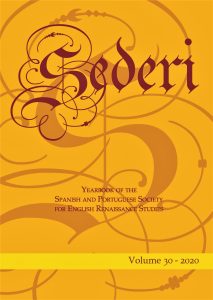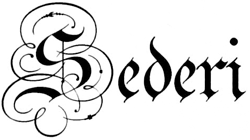
Sederi 30
Sederi 30 — 2020
EDITOR
Ana Sáez-Hidalgo
REVIEW EDITOR
María José Mora
ISSN 1135-7789
Luis Javier Conejero-Magro, “The School of Salamanca in the sixteenth century and the way kingship is canvassed in Shakespeare’s Richard II.” SEDERI 30 (2020): 7–28.
DOI: https://doi.org/10.34136/sederi.2020.1 Download PDF
Abstract
Although there appears to be no direct evidence that Shakespeare had access to the relectiones taught in the School of Salamanca during the sixteenth century, this study demonstrates that, forty years after their dissemination, the theories of Francisco Vitoria and his disciples were probably in circulation throughout England. The methodology in this article juxtaposes Shakespeare’s Richard II with one of Vitoria’s relectiones. This relectio modified the medieval idea of the divine origin of kingship, and generated a discussion about the origin of royal power which is central to the plot of Shakespeare’s play.
Keywords: Shakespeare; School of Salamanca; Richard II; kingship; Anglo-Spanish textual relations.
References
Alexander, Catherine M. S., ed. 2004. Shakespeare and Politics. Cambridge: Cambridge University Press.
Armitage, David, Conal Condren, and Andrew Fitzmaurice, eds. 2009. Shakespeare and Early Modern Political Thought. Cambridge: Cambridge University Press.
Brodie, Alexander. 2012. The Scottish Enlightenment. Edinburgh: Birlinn.
Brown Scott, James. 1928. El origen español del derecho internacional. Valladolid: Cuesta.
Brunstetter, Daniel R., and Cian O’Driscoll, eds. 2017. Just War Thinkers: From Cicero to the 21st Century. London: Routledge, Taylor & Francis.
Castilla Urbano, Francisco. 1992. El pensamiento de Francisco de Vitoria: filosofía política e indio americano. Barcelona: Anthropos.
Clegg, Cyndia. 1999. “Archival Poetics and the Politics of Literature: Essex and Hayward Revisited.” Studies in the Literary Imagination 32: 115–32.
Coleman, Janet. 2000. A History of Political Thought: From Ancient Greece to Early Christianity. Oxford: Blackwell.
Corrie, George Elwes, ed. (1574) 1850. “A Homilie Agaynst Disobedience and Wylful Rebellion.” In Certain Sermons: Appointed by the Queen’s Majesty. Cambridge: Cambridge University Press.
Cruz Cruz, Juan. 2013. “La translatio del poder and soberano—una teoría jurídico-política en el Siglo de Oro.” Medievalia 16 (2): 37–43.
DiMatteo, Anthony. 2011. “‘Our sovereign process’: Reading Shakespeare’s Politics.” College Literature 38 (2): 161–70.
Dollimore, Jonathan, and Alan Sinfield, eds. 1985. Political Shakespeare: New Essays in Cultural Materialism. Manchester: Manchester University Press.
Donner, H. W. 1951. “The Emperor and Sir Thomas Elyot.” The Review of English Studies 2 (5): 55–59.
Erasmus, Desiderius. (1960) 1992. Opus Epistolarum. Edited by P. S. Allen. Oxford and New York: Oxford University Press.
Forker, Charles R., ed. (2002) 2014. King Richard II. London: Bloomsbury, Arden Shakespeare Third Series, Thomson Learning.
Fox Morcillo, Sebastián. 1556. De regni regisque institutione. Antwerp: Gerard Speelman.
Green, Jeffrey. 2010. The Eyes of the People: Democracy in an Age of Spectatorship. Oxford: Oxford University Press.
Greenblatt, Stephen. (1988) 2001. Shakespearean Negotiations. Oxford: Oxford University Press and Clarendon Paperbacks.
Guzmán-Brito, Alejandro. 2013. “Breve relación histórica sobre la formación y el desarrollo de la noción de derecho definido como facultad o potestad (‘derecho subjetivo’).” Ars Iuris Salmanticensis Estudios 1: 69–91.
Hadfield, Andrew. 2003. “Timon of Athens and Jacobean Politics.” Shakespeare Survey 56: 215–26.
Hadfield, Andrew. 2004. Shakespeare and Renaissance Politics. London: Thomson Learning.
Hammer, Paul E. J. 2008. “Shakespeare’s Richard II, the Play of 7 February 1601, and the Essex Rising.” Shakespeare Quarterly 59 (1): 1–35.
Heller, Agnes. (1964) 1965. “Shakespeare and History” (review of Shakespeare Our Contemporary, edited by Jan Klott). New Left Review 1 (32): 16–23.
Hernández, Ramón. 1991. “The Internationalization of Francisco de Vitoria and Domingo de Soto.” Fordham International Law Journal 15 (4): 1031–59.
Houliston, Victor. 2013. Catholic Resistance in Elizabethan England: Robert Person’s Jesuit Polemic, 1580–1610. Aldershot: Ashgate.
Howard, Jean E. 2006. “Dramatic Traditions and Shakespeare’s Political Thought.” In British Political Thought in History, Literature and Theory 1500–1800, edited by David Armitage, 129–44. Cambridge: Cambridge University Press.
Iturbe, Mariano. 2012. “The Natural Law in the Times of St. Francis Xavier: Francisco de Vitoria (1492–1546).” In St Francis Xavier and the Jesuit Missionary Enterprise. Assimilations between Cultures, edited by Ignacio Arellano and Carlos Mata Induráin, 71–89. Pamplona: Servicio de Publicaciones de la Universidad de Navarra.
James VI and I. (1598, 1616) 1971. The Works. New York and Hildersheim: Georg Olms Verlag.
Kantorowicz, Ernst H. 1957. The King’s Two Bodies: A Study in Mediaeval Political Theology. Princeton, New Jersey: Princeton University Press.
Lake, Peter. 2016. How Shakespeare Put Politics on the Stage. London and New York: Yale University Press.
Lorenz, Philip. 2006. “Christall Mirrors: Analogy and Onto-theology in Shakespeare and Francisco Suárez.” Religion & Literature 38 (3): 101–19.
Lorenz, Philip. 2013. The Tears of Sovereignty: Perspectives of Power in Renaissance Drama. New York: Fordham University Press.
Lotman, Yuri. 2005. “On the Semiosphere.” Translated by Wilma Clark. Sign System Studies 33 (1): 205–26.
Luis-Martínez, Zenón. 2008. “Shakespeare’s Historical Drama as Trauerspiel: Richard II —And After.” ELH 75 (3): 673–705.
Morcillo, Aurora G., María Asunción Gómez, Paula de la Cruz-Fernández, and José Manuel Morcillo-Gómez, eds. 2018. The Modern Spain Sourcebook: A Cultural History from 1600 to the Present. London: Bloomsbury.
Moseley, Charles W. R. D. (1998) 2009. Shakespeare’s History Plays: Richard II to Henry V, the Making of a King. London: Penguin Books and Humanities-Ebooks, LLP.
Munro, Lucy. 2011. “Shakespeare and the Uses of the Past: Critical Approaches and Current Debates.” Shakespeare 7 (1): 102–25.
Murley, John A., and Sean Button, eds. 2006. Perspectives on Politics in Shakespeare. Oxford: Lexington Books.
Oort, Richard van. 2006. “Shakespeare and the Idea of the Modern.” New Literary History, Critical Inquiries 37 (2): 319–39.
Pope, Alexander. (1742) 1743. The Dunciad. Edited by George Faulkner. London and Dublin: M. Cooper at the Globe in Paster-Noster-Row.
Pugh, George W. 1953. “Historical Approach to the Doctrine of Sovereign Immunity.” Louisiana Law Review 13 (3): 476–94.
Rackin, Phyllis, and Jean E. Howard. 1997. Engendering a Nation: A Feminist Account of Shakespeare’s English Histories. London: Routledge.
Rackin, Phyllis. (1990) 1993. Stages of History: Shakespeare’s English Chronicles. Ithaca, New York: Cornell University Press.
Ramis Barceló, Rafael. 2018. “La presencia de Erasmo en las obras de Vitoria y Soto.” Relectiones 5: 93–114.
Romany, Frank. 1989. “Shakespeare and the New Historicism.” Essays in Criticism, A Quarterly Journal 39 (4): 271–88.
Sánchez Hidalgo, Adolfo. 2015. “Voluntarism and Intellectualism in Francisco de Vitoria.” Persona & Derecho 73: 181–202.
Sell, Jonathan P. A. 2018. “Sleep and the Shepherd-king in Quevedo and Shakespeare: An Essay in Comparative semiospherics.” ELH 85: 55–84.
Skinner, Quentin. 2014. Forensic Shakespeare. Oxford: Oxford University Press.
Soto, Domingo de. 1580. De Iustitia et iure. Salamanca: Excudebat Ioannes Baptista a Terranova.
Spiekerman, Tim. 2001 Shakespeare’s Political Realism. Albany: State University of New York Press.
Urdánoz, Teófilo, ed. 1960. Obras de Francisco de Vitoria. Relecciones Teológicas. Madrid: Biblioteca de Autores Cristianos.
Valenzuela-Vermehren, Luis. 2013. “The Origin and Nature of the State in Francisco de Vitoria’s Moral Philosophy.” Ideas y Valores 62 (151): 81–103.
Vitoria, Francisco de. (1528) 1960. “De potestate civili, proposition 21.” In Obras de Francisco de Vitoria. Relecciones Teológicas, edited by Teófilo Urdánoz, 107–290. Madrid: Biblioteca de Autores Cristianos.
Woolf, Daniel R. 2000. Reading History in Early Modern England. Cambridge: Cambridge University Press.
Zapatero, Pablo. 2009. “Legal Imagination in Vitoria – The Power of Ideas.” Journal of the History of International Law 11 (2): 221–71.
